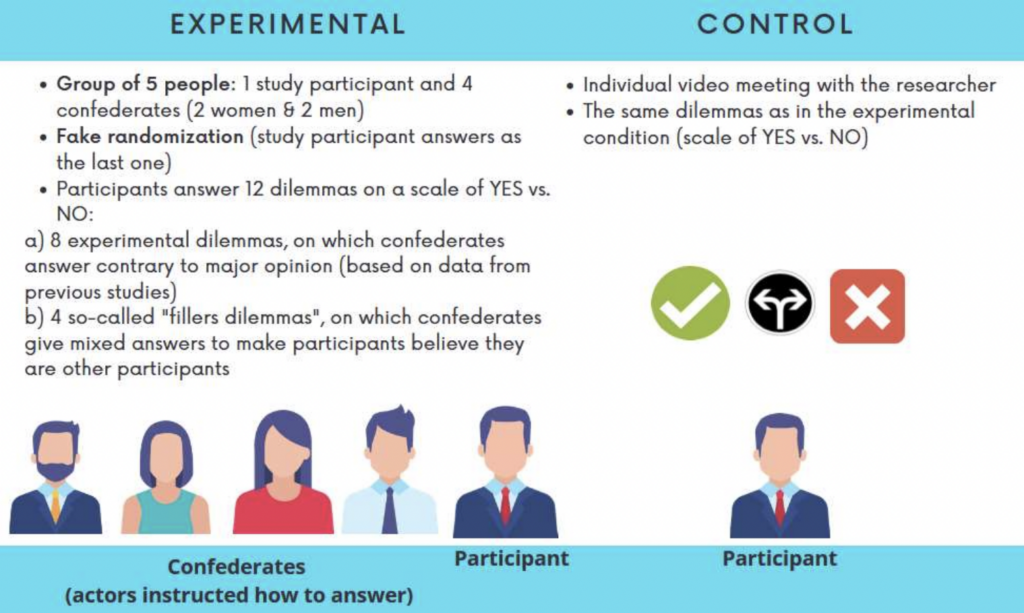Anyone who’s taken a course in social psychology will be familiar with Solomon Asch’s conformity experiments.
In the most famous version (see here), each participant is invited into a room with several other people who are posing as fellow participants but are actually actors. An experimenter shows the “participants” a series of boards with lines of different length on them. After each board has been shown, the “participants” are asked which line on the right-hand side is equal to the line on the left-hand side (a trivial task).
The “participants” answer in turn, with the real participant answering last. Unbeknownst to him, the actors have all been told to give the wrong answer. The experimenter records whether the real participant also gives the wrong answer. Asch found that about one third of participants did so.
Unlike many findings in social psychology, Asch’s has been replicated several times by other researchers – attesting to the power of social conformity.
In a new study, Mariola Paruzel-Czachura and colleagues applied Asch’s paradigm to online interactions, specifically video calls. And rather than asking about the lengths of lines, they presented moral dilemmas.
The researchers’ experimental design is shown in the image below.

There were two conditions: experimental and control. In the former, each participant joined a video call with four actors posing as fellow participants. In the latter, each participant joined the video call alone.
Participants in the experimental condition were given 12 moral dilemmas, four of which were ‘fillers’. In these cases, the actors gave mixed answers, or all gave the ‘right’ answer. They were included to make sure participants in the experimental condition didn’t cotton on to the purpose of the study.
At this point, you might be wondering, “How can there be a ‘right’ answer to a moral dilemma?” By ‘right’ answer, the researchers just meant the one that is typically given – since the moral dilemmas had been used in previous research. Here’s an example:

The ‘right’ (i.e., typical) answer is ‘yes’, but all the actors were told to answer ‘no’.
Conformity was measured as the percentage of participants in the experimental condition who gave the ‘wrong’ answer minus the percentage in the experimental condition who did so.
Paruzel-Czachura and colleagues found significant conformity effects for half of the eight experimental dilemmas (and the other half showed non-significant effects in the expected direction). On average, there was a 14 percentage point difference between the experimental and control conditions.
As the researchers note, their findings are relevant to the age of lockdown – during which video calls replaced face-to-face interaction for much of the population. One might expect that this mode of communication would reduce or eliminate social conformity, but that appears not to be the case.













To join in with the discussion please make a donation to The Daily Sceptic.
Profanity and abuse will be removed and may lead to a permanent ban.
Claiming ulez has any public benefits is on a par with claiming the Holocaust had some plusses for the Jewish community.
Or Nazi’s built some nice roads.
They did. You can still drive on them. I wasn’t keen on pretty much everything else they did.
I was in a discussion about Clean Air Zones the other day, and decided to do a bit of digging. Deaths from Asthma is what is usually quoted as justification, but these total 1,400 a year in the UK, not in the top 10 causes of death, and less than the excess deaths since lockdown by some margin.
Then I thought I’d compare India, you know with thick smog in the cities and wood and dung fires in the villages. Asthma sufferers in the UK 8% of population, India 3% of population. Curious, don’t you think. I mean, ULEZ and CAZ are all about revenue generation, but I’d like to understand why with filthy air, (and I’m old enough to remember filthy air here), India can have just a third of UK cases. Anyone explain it to me..?
Higher jabbed populations in UK?
Adjuvants are suspected to increase incidents of autoimmune disorders.
This data is from 2016, well before jabs. I suppose I’m curious about our modern lifestyle and intolerance of cold atmospheres and bacteria in general (…kills 99.,9% etc). Is anyone doing grown up research about it, I wonder, perhaps with an unpopular answer.?
I think AYM is right. Adjuvants have been used in vaccines since the 1920’s.
And over the last few years many kids have allergies to peanuts for God’s sake
WHY –
https://vaccinationinformationnetwork.com/peanut-allergy-yet-another-vaccine-related-epidemic-2/
Kids had virtually no immune disorders until after the 1980’s – which coincided with – guess what.
Now nearly 50% of kids suffer from –
Asthma.
Eczema.
Autism.
Obesity
And no doubt cancers in later life – if they get there.
WHY. Wild animals do not suffer from these problems, neither do 3rd world countries (although they are catching up).
I would refer people tp “Vaccinepapers.org” – but that page is no longer available.
I wonder why – nothing to do with bigpharma is it.
May they rot in hell.
Which, by all non partisan accounts, have exploded since WWII; now, what could possibly have caused that?
I suspect the differences between UK and India are linked to diagnosis. I have worked with lots of people who claimed to be asthmatic when the reality was they were just unfit. Doctors are happy to write prescriptions and the ‘patients’ are chuffed to bits to be ‘victims.’
‘Where’s mi puffer?’
How many neo asthmatics had their immune system function tested prior to that prescription? I suspect none.
I know I did not; severe allergies that peaked in my mid 30’s (or so I thought) were attributed to some form of asthma by GP and I was prescribed steroids… had all childhood jabs. Circa 2016 developed extremely severe Anaphylaxis….now every day I have to be on red alert.
Still, to my knowledge, immune system never tested….Ig3/Ig4 capacity? GP now very arsey about ANY testing regimes, and will not consider this course of action until some ill health event occurs – their words , not mine.
Having visited Delhi and seen the summary of the causes of air pollution, the primary one was road dust, by a large margin, followed by diesel particulates because of the mass of very old and unmaintained lorries and buses. Just resurfacing Delhi’s (main) roads and replacing these old lorry/bus engines with modern units would provide a massive cut in air pollution. I would also imagine the situation in Delhi is replicated in most major cities.
I know they built nice roads, that is why I made that remark. —–But I am so glad you were not keen on other things they did. ——-ULEZ is more than just a revenue generator though. It is all part of the GREEN war on cars and on the western world in general.
Very tempted to link that sort of comment with “some thing and someone else” but on balance I will stop there…
ULEZ does not save lives –
leaflet to print at home and deliver to neighbours or forward to politicians, media, friends online.
Muslim Khan lying? Wow. Shocker. Particulate pollution is down 98% since the 70s. There isn’t a pollution issue from cars. They emit trace amounts.
Now maybe address the marketing and terror campaign for Rona and the safe and effective mantras which were splashed everywhere (and still are). Oh wait. People who oppose Pharma end up dying. Maybe pass on that one.
I would vote for a chair, a turnip, or a pile of dogshit before I voted for this parasite.
The dirty little secret is that much ulez funding derives from investors in green energy/battery powered vehicles.
Where does Khan invest his own money?
He loves a one way bet…….
As a chemist in a former life, I had to chuckle at the reference to “reducing levels of nitrogen dioxide (NO2) particles”. I assume it’s just another example of the Telegraph employing technically illiterate interns to comment on scientific matters.
Boris & Khan were both elected on mandates to lower public transport prices or stop them rising. This has caused big problems with the finances, hence the increase in the LEZ to bring in more money.
It has nothing to do with pollution as the cars are not stopped entering but charged to enter.
The other increase in pollution is the slow movement of buses through the City caused by the increase in cycle only lanes, even though buses are the greener solution, as they can transport greater numbers per metre of road space than cycles.
The electoral procedure is also changing in 2024 favouring Khan unless another notable Independent stood on the Left.
Exactly. It was always about money, they just needed a reason for the charges. The fact that if you pay you can enter, even in a smoky fume spouting old banger, completely torpedoes their argument The real problem of pollution is the London Underground.
I despair that Khan could get another term if the electoral procedure changes favour him. He’s ruining the city I was born in and spent a large part of my life in. I haven’t been to London for ages but I remember it with great affection. Getting rid of the Routemaster buses was a major blow.
Why shouldn’t my ex-wife enter London.
Hahahaha! Good one, Roubles 😀
I agree it is very sad and I am fortunate to have wonderful memories of my time in London.
Our world seems to be changing with the young folk no longer having the same need or interest to explore as we had. I do not know why and expect to be shouted down and down ticked for these thoughts.
Good shooting ATR; he did not perform well when he was summoned to a session of ? Westminster Council ? to “discuss” this. The video of the person with the air quality monitor going from road to Underground immediately in the vicinity tells you everything.
How will he be sanctioned; appears to me that the punishment is in inverse proportion; bigger the lie by a person in a position of trust in the tax payer funded public sector the diminution of any sanction shrinks further. Banning from any future public office should be the de minimus punishment to be enhanced the bigger the lie.
Sorry, do you know I thought I was living in the UK for a moment.
Khan lied. Quelle surprise (not).
ULEZ is about control, surveillance, money and forcing poor and marginalised people out of their cars.
Seconded 👍
Passed without a “lobby clearing division”, imho.
Not the first time this man has ‘misled’ in order to impose his own way.
“The Vice-Chancellor of Imperial College, who was at the reins during the Covid modelling scandal and the Ulez data scandal, has been given the biggest pay rise of any V-C in the UK. Her salary ‘bump‘ of £186,000 brings her total remuneration, including salary and benefit, to £714,000.”
Presumably funded by W Gates.
“The Advertising Standards Authority (ASA) is set to criticise Transport for London (TfL)”. Criticise!! The ASA should fine Kahn in the form of all ULEZ charges to date being returned to the vehicle owners, and all future ones declared null & void by the same token, effectively scrapping the scheme.